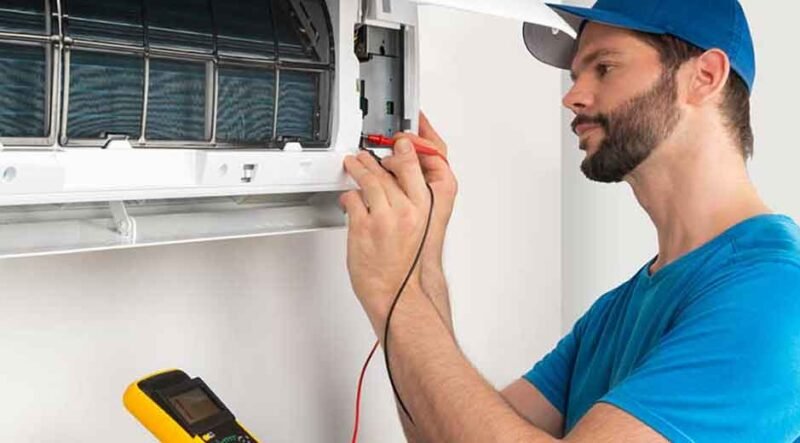How often do you think about your HVAC system, asks Vesta Management group. For most people, the answer is probably “not until something goes wrong.” But by the time you’re dealing with strange noises, weak airflow, or a complete system failure, the damage is already done, and the repair bill might be a lot bigger than expected.
Preventative HVAC maintenance isn’t just a nice-to-have. It’s one of the smartest, most cost-effective decisions a homeowner can make. Whether your system is brand new or several years old, keeping it in good shape saves money, improves comfort, and extends its lifespan.
Let’s look at the reasons why scheduling regular HVAC maintenance is worth the effort.
1. Avoid Expensive Repairs
HVAC issues rarely appear out of nowhere. Most start small—loose parts, clogged filters, minor leaks—and grow into major problems when left unchecked.
Routine HVAC maintenance gives technicians the chance to catch and fix those small issues before they turn into costly repairs. A cracked heat exchanger, for example, can cost thousands to replace, but a simple check-up could spot early warning signs long before failure.
Think of it like this: paying a modest fee for a tune-up now could save you hundreds or even thousands later.
2. Increase Energy Efficiency
An HVAC system that hasn’t been maintained will work harder than it needs to. Dirt buildup on coils, clogged filters, or aging components force the system to use more energy just to produce the same results. That means higher utility bills each month.
Clean systems, properly calibrated thermostats, and well-lubricated parts make a huge difference in how efficiently your HVAC system runs. Regular maintenance keeps everything optimized, so you get the most out of your energy use without wasting a dime.
3. Extend Equipment Lifespan
HVAC systems are not cheap. Whether it’s a furnace, heat pump, or central air conditioning unit, replacing it is a major investment. Regular maintenance helps ensure you get the longest possible life from that investment.
When components are kept clean and well-maintained, they wear down more slowly. Systems that receive annual care often last several years longer than neglected ones. And when parts are replaced at the right time, they can prevent other parts from being damaged by the strain.
In short, maintenance helps your system age gracefully.
4. Better Air Quality Indoors
The air you breathe every day is affected by your HVAC system. Dust, pollen, mold spores, and other airborne particles can build up in the system over time, especially if filters are not changed regularly.
Regular maintenance helps improve indoor air quality in several ways:
- Clean filters– Capture more dust and allergens before they circulate
- Clear ducts– Prevent mold or bacteria buildup inside the system
- Proper airflow– Ensures stale air doesn’t linger and fresh air circulates properly
For households with allergies, asthma, or other respiratory conditions, this can make a noticeable difference in comfort and health.
5. Maintain Warranty Coverage
This is one many people overlook. Some HVAC manufacturers require proof of regular maintenance in order for the warranty to remain valid. If you skip check-ups and something breaks down, you might be left paying for repairs that would otherwise be covered.
Scheduled service visits not only keep your system running well but also keep your warranty intact. It’s a small step that protects you from bigger headaches down the line.
6. More Reliable Comfort Year-Round
You don’t want to find out your heater isn’t working during the first cold snap of winter. Or that your AC is struggling right when the summer heat hits. Regular HVAC maintenance helps prevent those sudden surprises.
By testing performance ahead of each season, technicians can make sure your system is ready for extreme temperatures. They’ll check refrigerant levels, inspect connections, and run full diagnostics to catch anything that could interrupt your comfort.
That peace of mind is hard to beat, especially when the weather gets unpredictable.
7. Lower Monthly Utility Bills
Energy costs add up quickly, especially if your HVAC system isn’t running efficiently. When systems are dirty or worn out, they use more energy, and that shows up on your monthly bills.
Here’s what regular maintenance can do:
- Improve efficiency– Well-maintained systems use less energy to heat or cool your home
- Prevent overuse– Systems don’t have to run as long to maintain the desired temperature
- Catch issues early– Fixing small problems prevents energy-wasting breakdowns
Over time, these improvements can lead to noticeable savings on your utility costs. And unlike replacing the entire system, maintenance doesn’t require a major upfront cost.
8. Reduce Emergency Breakdowns
Few things are more frustrating than an HVAC breakdown at the worst possible time. Whether it’s during a holiday, in the middle of a heatwave, or late at night when no one’s available, these emergencies are stressful and often expensive.
Regular service helps reduce the chances of that happening. By inspecting, testing, and tuning your system throughout the year, technicians can flag and resolve problems before they cause a full shutdown.
While no system is completely breakdown-proof, the risk goes way down when maintenance is part of your routine.
9. Safer Operation
A faulty HVAC system isn’t just inconvenient; it can also be unsafe. Gas leaks, electrical issues, carbon monoxide exposure, and fire hazards are all potential risks if a system is not properly maintained.
Routine checks can detect these risks early. Safety switches, burners, heat exchangers, and electrical wiring are all areas that should be inspected regularly to ensure safe operation.
For households with young kids, older adults, or anyone with health conditions, these safety checks provide extra protection and peace of mind.
Make Maintenance Part of Your Routine
If it’s been more than a year since your HVAC system had a check-up, now is the time to schedule one. Don’t wait for a breakdown or a spike in your bills to remind you. Adding maintenance to your seasonal home checklist is one of the best decisions you can make for comfort, efficiency, and long-term savings.
Want fewer repairs, lower bills, better air, and a longer-lasting system? Regular maintenance makes it happen.








